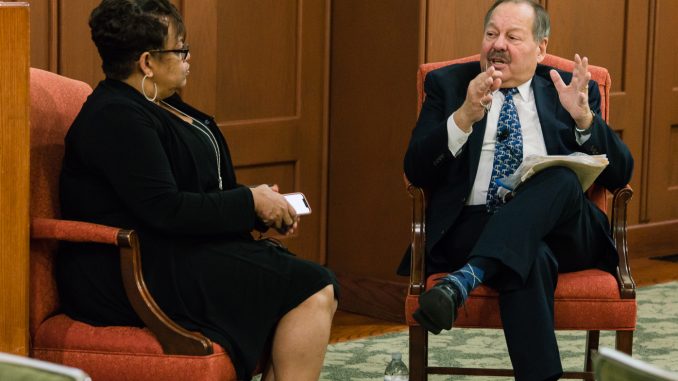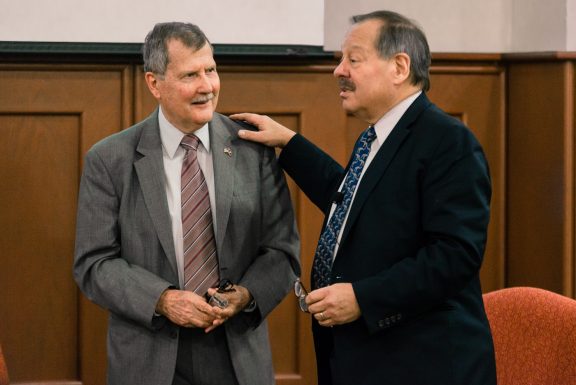
Judge Nelson Díaz wasn’t sure about his decision when he first enrolled at Temple University.
He realized no Puerto Rican had ever graduated from Beasley School of Law and no Latino had been admitted to the Pennsylvania Bar Association.
“That was a pretty shocking experience for me as I entered the law school,” said Díaz, a 1972 law alumnus who is Puerto Rican.
The late former university president Peter Liacouras, a law professor at the time, contacted Díaz after noticing his participation in a New York City-based program for minorities interested in law school. He convinced Díaz that studying law at Temple was the right choice, and Díaz moved to Philadelphia.
“He said that they had a wonderful Latino community in Philadelphia and that I would be a wonderful contribution to Philadelphia,” said Díaz, who served on the Court of Common Pleas until 1993. “He sold me a bill of goods, and I bought it.”
Díaz, who serves on the Board of Trustees, wrote “Not from Here, Not from There/No Soy de Aquí ni de Allá,” an autobiography about his life, career milestones and advocacy work in Washington, D.C. and Philadelphia.
Díaz became the first Latino to pass the Pennsylvania bar exam in 1972 and the first Latino judge in Pennsylvania history in 1981.
Díaz’s success on the exam came after Liacouras, who served as dean of the Beasley School of Law from 1973-82 and later as university president, and other members of the Philadelphia Bar Association Special Committee on Pennsylvania Bar Admission Procedures concluded that the exam was discriminatory.
They found the State Board of Law Examiners intentionally discriminated against African-Americans, so they changed exam procedures to remove biases against minorities in 1971 and 1972.

Díaz said he wants his book, which Temple University Press published in September, to teach people not to give up. At age 15, he couldn’t read or write proficiently in English and experienced poverty and violence in West Harlem.
Díaz’s mother and his community helped him focus on school. His grades improved, and he got accepted to St. John’s University in Queens, New York, where he graduated with honors in 1969.
“Education is the only equalizer for anyone,” he said. “If people can realize that at age 15, just because you have some difficulties, if you put your mind to something, there is nothing impossible for you to achieve.”
Trustee Daniel Polett, who has known Díaz for about 30 years, said Díaz’s book is interesting because of his incredible background.
“When reading, you get to learn about the challenges he faced and his continuous persistence to overcome these challenges,” Polett said.
Díaz, a partner at Philadelphia-based law firm Dilworth Paxson LLP, is known for his advocacy work in court reform, energy, housing and economic development. He is a founding member and officer at the Latino Corporate Directors Association, a Washington, D.C.-based organization that provides professional development to Latinos interested in joining corporate boards.
“I personally cannot benefit from many things because of my age, but I can still strive to open doors that haven’t been opened in the past for individuals,” Díaz said.
He added he tries to better the university, like encouraging Temple officials to admit students who don’t have high standardized test scores.
“I would have never thought about law school because my SAT scores were terrible, so giving kids a chance who do not have the highest score but have the motivation to work is what we are looking for,” he added. “We want to give these kids a chance that they will not get anywhere else.”
Díaz has received several awards, like the Philadelphia Bar Association’s Justice Sonia Sotomayor Diversity Award in 2015.
“He is a very compassionate man,” Polett said. “He is always trying to make sure that everything is fair and equal.”
Stephen Levin, Díaz’s friend for 39 years and a former co-worker at the now-closed Philadelphia firm Wolf, Block, Schorr and Solis-Cohen, said Díaz has always inspired him.
“I know how difficult it was for him to accomplish what he has and how he had to overcome these obstacles,” said Levin, a 1970 liberal arts alumnus.
Díaz hopes to pass along the same kindness and support he received when he was a student and young professional.
“There could be more people like me if someone goes after one person like Peter went after me,” Díaz said.



Be the first to comment